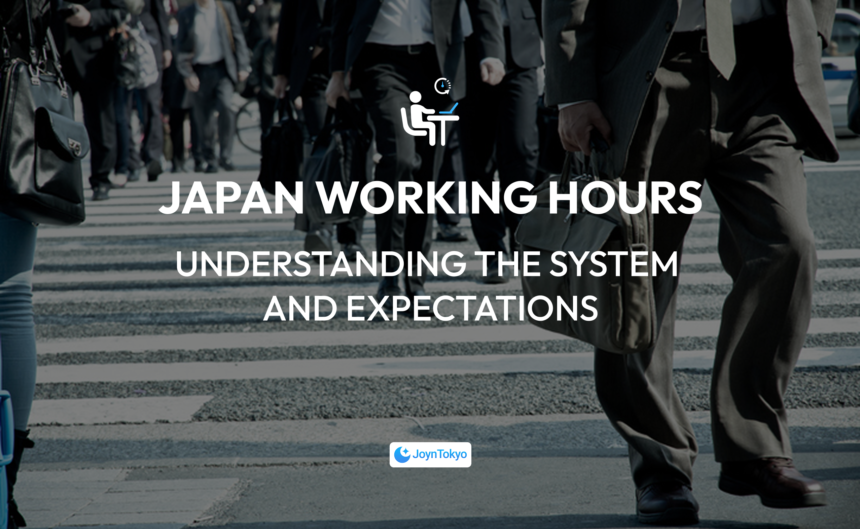Introduction
Japan is known for its strong work ethic, and its working hour system has long been a topic of interest for foreigners considering employment in the country. Whether you are planning to work in Japan or are already employed, understanding how the working hour system operates is essential. This article explores the average working hours, how they vary depending on industry and position, the regulations that govern them, and the impact on work-life balance. Additionally, we will discuss recent labor reforms, their effectiveness, and considerations for foreign workers in Japan.
Standard Working Hours in Japan
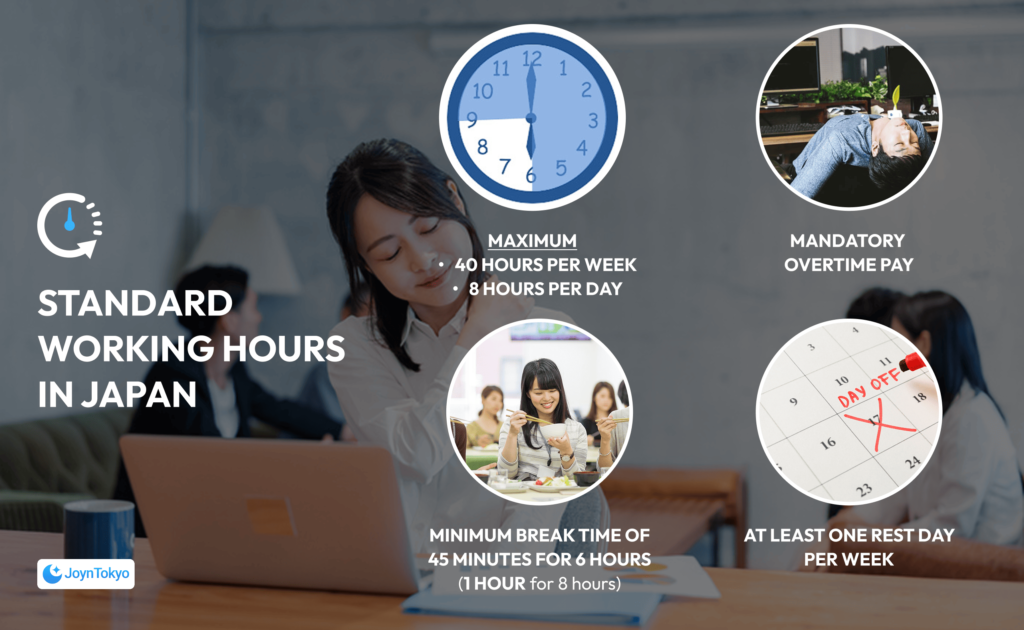
The standard working hours in Japan are primarily governed by the Labor Standards Act, which sets:
- A maximum of 40 hours per week and 8 hours per day.
- Mandatory overtime pay for exceeding these limits.
- Minimum break time of 45 minutes for shifts exceeding six hours, and one hour for shifts over eight hours.
- At least one rest day per week.
While these regulations provide a framework, actual working conditions vary significantly based on industry, company, and job role. Some companies have adopted flextime systems, allowing employees to adjust their working hours. However, certain professions, such as senior executives and highly specialized technical workers, may be exempt from these regulations.
Variations by Industry and Job Position
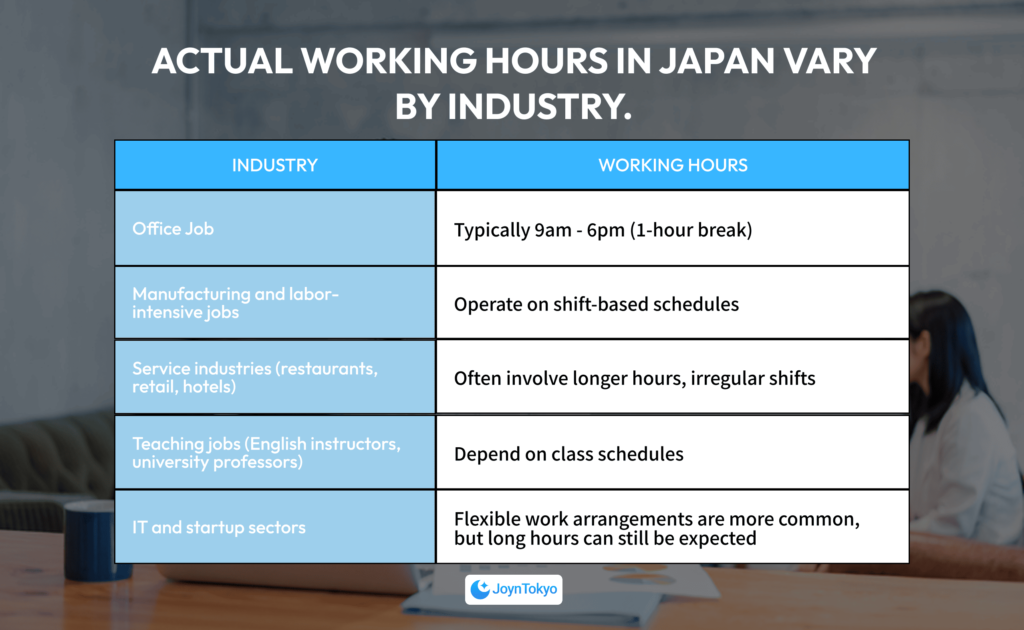
Despite the legal 40-hour workweek, actual working hours often depend on the industry:
- Office jobs: Typically follow a 9 AM to 6 PM schedule with a one-hour break, though unpaid overtime is sometimes expected.
- Manufacturing and labor-intensive jobs: Operate on shift-based schedules, which may include night shifts and weekend work.
- Service industries (restaurants, retail, hotels): Often involve longer hours, irregular shifts, and frequent work on public holidays.
- Teaching jobs (English instructors, university professors): Depend on class schedules, often involving evening lessons and additional preparation work.
- IT and startup sectors: Flexible work arrangements are more common, but long hours can still be expected due to tight project deadlines.
Overtime Culture in Japan
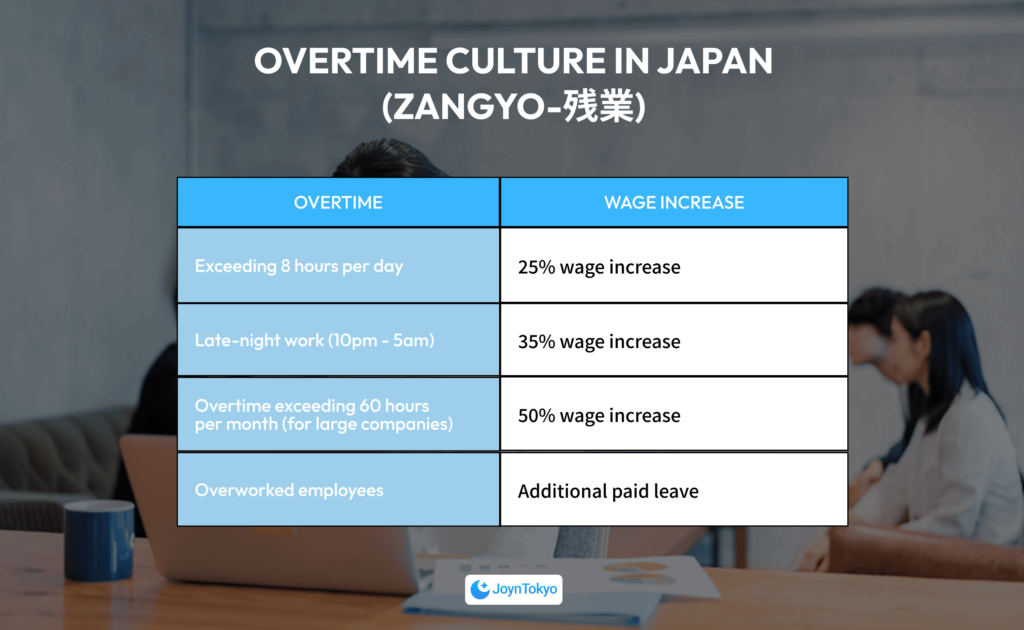
Overtime, known as “zangyo” (残業), has historically been a major part of Japanese work culture. While labor laws mandate overtime pay, many employees feel pressured to work beyond their scheduled hours due to company expectations and social norms.
To curb excessive overtime, Japanese labor laws require employers to provide:
- 25% wage increase for overtime exceeding eight hours per day.
- 35% wage increase for late-night work (10 PM – 5 AM).
- 50% wage increase for overtime exceeding 60 hours per month (for large companies).
- Additional paid leave for overworked employees in some companies.
Some industries have introduced overtime caps and policies to mitigate excessive work hours, though cultural expectations still influence workplace norms.
Paid Time Off and National Holidays

Employees in Japan receive ten days of paid leave after six months of employment, with an increase annually up to 20 days maximum. However, many workers hesitate to take leave due to workplace norms that prioritize presenteeism. Some progressive companies have introduced unlimited paid time off or actively encourage employees to use their allocated leave. To prevent excessive accumulation, unused leave often expires after two years.
Japan has 16 national holidays, but whether employees receive time off depends on company policies. Some companies offer extended breaks during major holidays, such as:
- New Year’s holidays (お正月休み) – December 29 to January 3.
- Golden Week (ゴールデンウィーク) – A series of holidays in late April to early May.
- Obon (お盆休み) – Mid-August holiday observed by many companies.
- Personal & sick leave – While not legally mandated, some companies provide these benefits.
- Compensatory leave – Employees working on public holidays may receive alternative leave days.
Recent Changes and Future Trends
Japan has been undergoing work-style reforms aimed at improving working conditions and encouraging a better work-life balance. The Work Style Reform Laws were introduced to combat excessive overtime and address demographic challenges. These reforms include:
- Limiting overtime hours to 45 per month and 360 per year (with some industry exceptions).
- Promoting equal pay for equal work for full-time and contract workers.
- Encouraging remote work and flexible schedules.
- Improving support for working parents, such as enhanced parental leave.
- Experimenting with four-day workweeks in some companies.
The COVID-19 pandemic accelerated the adoption of remote work, particularly in IT and international companies. While traditional firms still favor in-office work, hybrid models are gaining acceptance. Digital transformation has increased efficiency, reducing the need for excessive overtime, and some companies have implemented work-life balance monitoring tools to track employee well-being and prevent burnout.
Workplace Challenges: “Karoshi” and Work-Life Balance Efforts

Japan has long struggled with karoshi (過労死, “death from overwork”), leading to significant legal and cultural shifts to address the issue. Government initiatives, such as Premium Friday, were introduced to encourage workers to leave early on the last Friday of each month, but adoption remains low.
In response to concerns about overwork, some companies have implemented mandatory leave policies to ensure employees take time off. Others have established caps on overtime hours to prevent excessive workloads. Additionally, mental health support programs have been introduced in various workplaces to help employees cope with work-related stress and maintain a healthier work-life balance.
Advancements in technology have also played a role in addressing work-life balance concerns. AI-powered work management systems are being used by some companies to optimize workloads, reduce inefficiencies, and create a more sustainable working environment.
Considerations for Foreign Workers in Japan
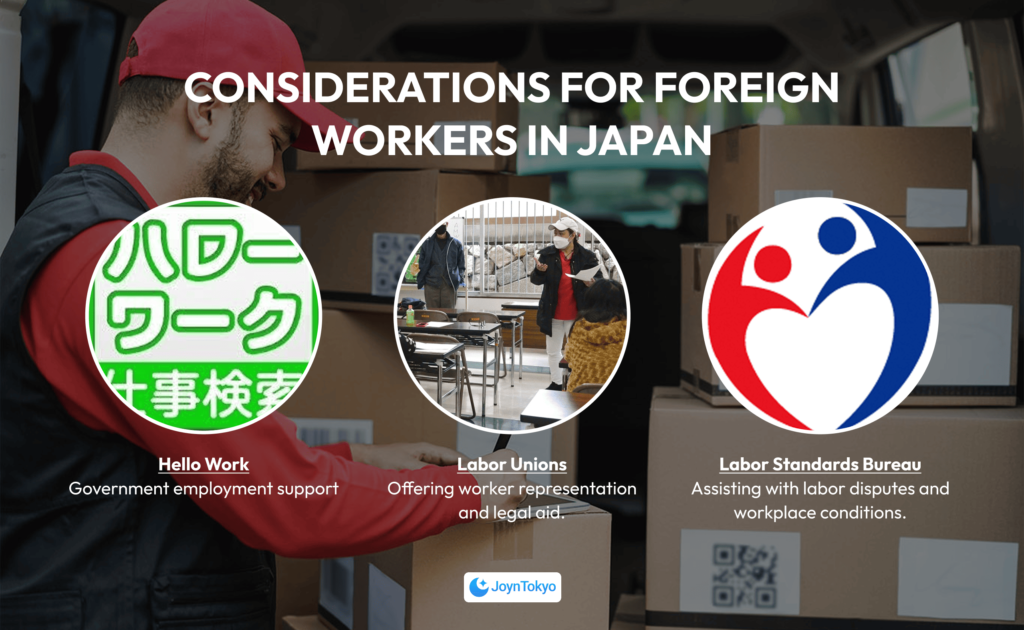
Foreign workers in Japan should be aware of industry norms, company policies, and legal rights before accepting a job. Different sectors have varying expectations regarding working hours and overtime. Understanding labor rights is crucial to ensuring fair treatment, especially regarding overtime pay and leave entitlements.
If workers face unfair treatment, they can seek assistance from organizations such as:
- Hello Work – Government employment support.
- Labor unions – Offering worker representation and legal aid.
- Labor Standards Bureau – Assisting with labor disputes and workplace conditions.
Some international companies in Japan offer more flexible work arrangements, making them attractive options for foreign professionals.
Final Thoughts
Japan’s working hour system continues to evolve, balancing traditional work expectations with modern efforts to improve work-life balance. While legal frameworks define standard hours and protections, company culture still plays a major role in shaping actual working conditions.
Foreign workers considering employment in Japan should thoroughly research industry norms, company policies, and legal rights. As workplace reforms progress, Japan is gradually shifting toward a more flexible and sustainable work culture, integrating better well-being initiatives and modern work arrangements.

